Bio 315 exam 1 - Study guides, Class notes & Summaries
Looking for the best study guides, study notes and summaries about Bio 315 exam 1? On this page you'll find 74 study documents about Bio 315 exam 1.
Page 4 out of 74 results
Sort by
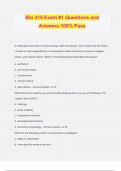
-
Bio 315 Exam #1 Questions and Answers 100% Pass
- Exam (elaborations) • 10 pages • 2024
-
- $12.49
- + learn more
Bio 315 Exam #1 Questions and Answers 100% Pass A histologist examines a of tissue using a light microscope. She notices that the tissue consists of cells separated by an extracellular matrix containing numerous collagen, elastic, and reticular fibers. Which of the following best describes this tissue? a. epithelium b. connective tissue c. muscle tissue d. nervous tissue e. gland tissue - Correct Answer ️️ -B Which branch of anatomy are you primarily studying when you go to the Bio...
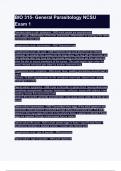
-
BIO 315- General Parasitology NCSU Exam 1 Questions with 100% Actual correct answers | verified | latest update | Graded A+ | Already Passed | Complete Solution 2024 - 2025
- Exam (elaborations) • 4 pages • 2024
- Available in package deal
-
- $7.99
- + learn more
BIO 315- General Parasitology NCSU Exam 1 Questions with 100% Actual correct answers | verified | latest update | Graded A+ | Already Passed | Complete Solution
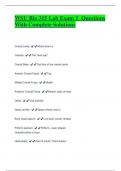
-
WSU Bio 315 Lab Exam 1 Questions With Complete Solutions
- Exam (elaborations) • 13 pages • 2024
- Available in package deal
-
- $11.99
- + learn more
WSU Bio 315 Lab Exam 1 Questions With Complete Solutions Cranial cavity ️️Where brain is Calvaria ️️The "skull cap" Cranial Base ️️The floor of the cranial cavity Anterior Cranial Fossa ️️Top Middle Cranial Fossa ️️Middle Posterior Cranial Fossa ️️Bottom, back of head Orbits ️️"Eye sockets" Nasal cavities ️️Space where nose is Bony nasal septum ️️Line down center, divides Piriform aperture ️️Piriform = pear shaped Outside/outline of nose
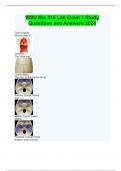
-
WSU Bio 315 Lab Exam 1 Study Questions and Answers 2024
- Exam (elaborations) • 27 pages • 2024
- Available in package deal
-
- $14.49
- + learn more
Cranial cavity Where brain is Calvaria The "skull cap" Cranial Base The floor of the cranial cavity Anterior Cranial Fossa Top Middle Cranial Fossa Middle Posterior Cranial Fossa Bottom, back of head Orbits "Eye sockets" Nasal cavities Space where nose is Bony nasal septum Line down center, divides Piriform aperture Piriform = pear shaped Outside/outline of nose Hard palate Roof of mouth, "brain freeze" Zygomatic arch Bone in cheek ...
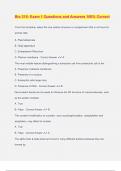
-
Bio 315- Exam 1 Questions and Answers 100% Correct
- Exam (elaborations) • 14 pages • 2024
- Available in package deal
-
- $12.49
- + learn more
Bio 315- Exam 1 Questions and Answers 100% Correct From the list below, select the one cellular structure or compartment that is not found in animal cells: A. Plasmodesmata B. Golgi apparatus C. Endoplasmic Reticulum D. Plasma membrane - Correct Answer ️️ -A The most reliable feature distinguishing a eukaryotic cell from prokaryotic cell is the: A. Presence of plasma membrane B. Presence of a nucleus C. Eukaryotic cells larger size D. Presence of DNA - Correct Answer ️️ -B No...
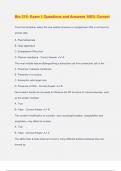
-
Bio 315- Exam 1 Questions and Answers 100% Correct
- Exam (elaborations) • 14 pages • 2024
-
- $12.49
- + learn more
Bio 315- Exam 1 Questions and Answers 100% Correct From the list below, select the one cellular structure or compartment that is not found in animal cells: A. Plasmodesmata B. Golgi apparatus C. Endoplasmic Reticulum D. Plasma membrane - Correct Answer ️️ -A The most reliable feature distinguishing a eukaryotic cell from prokaryotic cell is the: A. Presence of plasma membrane B. Presence of a nucleus C. Eukaryotic cells larger size D. Presence of DNA - Correct Answer ️️ -B No...
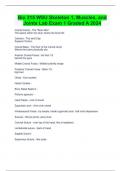
-
Bio 315 WSU Skeleton 1, Muscles, and Joints Lab Exam 1 Graded A 2024
- Exam (elaborations) • 23 pages • 2024
- Available in package deal
-
- $15.99
- + learn more
Cranial Cavity - The "Brian Box" The space within the skull, where the brain fils Calvaria - The skull Cap Superior Portion Cranial Base - The floor of the cranial cavity Where the brain physically sits Anterior Cranial Fossa - the first 1/3 behind the eyes Middle Cranial Fossa - Middle butterfly shape Posterior Cranial Fossa - Back 1/3 big bowl Orbits - Eye sockets Nasal Cavities - Bony Nasal Septum - Piriform aperture - Hard Palate - roof of mouth Zy...
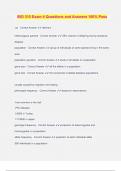
-
BIO 315 Exam 4 Questions and Answers 100% Pass
- Exam (elaborations) • 18 pages • 2024
-
- $12.49
- + learn more
BIO 315 Exam 4 Questions and Answers 100% Pass aa - Correct Answer ️️ -albinism heterozygous parents - Correct Answer ️️ -25% chance of offspring having recessive disease population - Correct Answer ️️ -group of individuals of same species living in the same area population genetics - Correct Answer ️️ -study of all alleles in a population gene pool - Correct Answer ️️ -all the alleles in a population gene flow - Correct Answer ️️ -the movement of alleles between ...
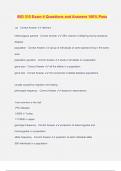
-
BIO 315 Exam 4 Questions and Answers 100% Pass
- Exam (elaborations) • 18 pages • 2024
-
- $12.49
- + learn more
BIO 315 Exam 4 Questions and Answers 100% Pass aa - Correct Answer ️️ -albinism heterozygous parents - Correct Answer ️️ -25% chance of offspring having recessive disease population - Correct Answer ️️ -group of individuals of same species living in the same area population genetics - Correct Answer ️️ -study of all alleles in a population gene pool - Correct Answer ️️ -all the alleles in a population gene flow - Correct Answer ️️ -the movement of alleles between ...
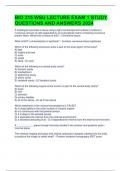
-
BIO 315 WSU LECTURE EXAM 1 STUDY QUESTIONS AND ANSWERS 2024
- Exam (elaborations) • 12 pages • 2024
- Available in package deal
-
- $14.49
- + learn more
A histologist examines a tissue using a light microscope and notices it contains a numerous amount of cells separated by an extracellular matrix containing numerous protein fibers. What kind of tissue is this? - Connective tissue What is NOT a characteristic of epithelia? - Contains numerous blood capillaries Which of the following structures is/are a part of the axial region of the body? A) legs B) fingers and toes C) arms D) wrists E) Neck - E) neck Which of the following is a do...

How did he do that? By selling his study resources on Stuvia. Try it yourself! Discover all about earning on Stuvia


